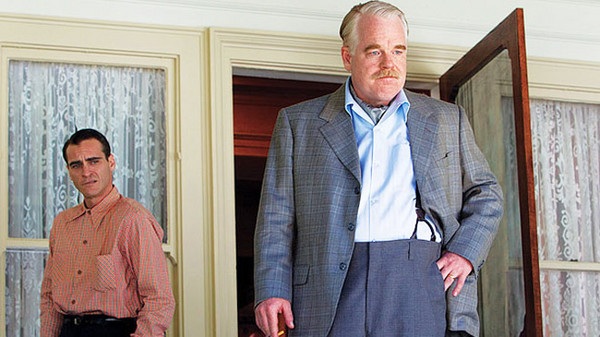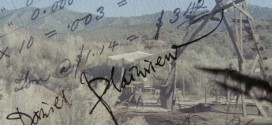Spoiler Scale (How spoilerly is this article on a scale of 1 to 10?): 3
Some members of the film critic world have dubbed writer/director Paul Thomas Anderson the new Kubrick, and with five years passing since the release of his last film, The Master is easily one of the most anticipated films of this year. Anderson’s unlikely romantic comedy Punch-Drunk Love (2002) marked a transition away from the sprawling ensemble pieces that first put him on the map (Boogie Nights (1997), Magnolia (1999)). And now it seems that There Will Be Blood (2007) started a new trend in his oeuvre – films that center around a single character, a force of nature, who just refuses to arc.
Contrary to its title, The Master actually focuses on Freddie Quell (Joaquin Phoenix) – one of Tom Brokaw’s Greatest Generation who is just a few years out of WWII, drifting from job to job, and eager to do little more than indulge his inclinations for sex and homemade intoxicants (in tandem, if possible). Freddie eventually crosses paths with Lancaster Dodd (Philip Seymour Hoffman), referred to as “Master” by the members of his burgeoning cult (the “Cause”), who is dead set on combating Freddie’s id with some superego. (“We are not part of the animal kingdom, we sit far above that crowd.”) It is the dance of dialogue between these two characters – and not any sort of conventional plot – that propels the film.
As both writer and director, Anderson is at the top of his game. From the opening sequence of Boogie Nights, Anderson exhibited a penchant for an over-the-shoulder perspective from the Scorsese school of visual storytelling. But Anderson’s style has evolved into something distinctive. At times, the camera takes the perspective of a sauntering bystander perusing the action. At other times during scenes of dialogue, the focus shifts hard from the foreground to the back – even to the point of moving off of the speaker, as if we are supposed to be distracted at times.
From The Master, we can rightfully expect multiple acting nominations come award season. Phoenix’s physical performance is above and beyond the call of duty, always looking worn to a point well in excess of his 37 years and often assuming a posture that matches the stage of his character’s psychological evolution. While it is easy to take Hoffman’s nuance for granted at this point in his career, the character of Charismatic Cult Leader would surely be overplayed in lesser hands. And within a movie that oozes male pathos, Amy Adams stands out in her depiction of Lancaster’s nth wife, which is both quietly commanding and a touch unsettling in the sense that we never quite know whether she’s a true believer in Lancaster, the Cause, or both.
All that said, the whole is never greater than the sum of the parts. I suspect that the subjective will inform much of each viewer’s experience of this particular film. But if I must offer an objective explanation of why I found this film to be oddly uncompelling, it would have to be the choppy pacing. For the stellar level of craft at work here, the series of scenes that make up this movie do not always fit well together. The film’s sense of time often seems to get lost – particularly at the beginning and end of the film and in the flashback sequences – and not in a way that serves the narrative or the character development. (Phoenix’s unchanging appearance doesn’t help matters.) And where the ending of There Will Be Blood was a punch in the gut, the ending of The Master is just – well, unsatisfying.
On what is perhaps a related point, I cannot recall the last time that I saw so many scenes in the trailers to a film that were not actually in the released movie (e.g., “Just say something that’s true!”). Is Anderson constructing the trailers to deliberately play with audience expectations? Or is this a sign that the film was (over-)edited up to the last-minute? On second thought, I probably don’t want to know the answer to that.
Grade: B+





Bill and I also couldn’t believe how much from the trailers didn’t make it into the movie. I’m a huge PTA fan, and most of what I have to say about The Master is positive. I felt it was a lot more claustrophobic feeling than any of his previous films, and the odd sense of time almost added to my “seasickness” while watching the film.
The ending was baffling to me, and as you said, really unsatisfying. Maybe it will improve for me on a second watching though.
I was thinking the same thing coming out of the theatre. Six months down the road, do you think you would rather rewatch (a) The Master, (b) There Will Be Blood, or (c) Boogie Nights?
There Would Be Blood for sure, with d) Magnolia being second.
Given your second to last paragraph, I’m a little surprised you graded the film so high. Although – perhaps I do understand the conflict you seem to be expressing about the film because it’s there for me, too – the conflict between the brilliance of the parts and the bafflement of the whole. The “parts” of the film are brilliant in so many ways – the music and sound (phenomenal, its unsettling oddness and beauty, by turns, beautifully juxtaposed with the images/scenes), the acting, the composition of shots and cinematography, the editing (some really fantastic shifts/dissolves which play with our expectations of the story) – so much to praise there. But. As you say, I found and am finding, in reflection, the film as a “sum,” oddly uncompelling; I feel no emotional connection to it at all (it made me intensely uncomfortable, frequently, but that’s different, and perhaps just tied to Freddy himself, the way he holds his body). Nothing about it moves me. And even its ideas – the film seems to be “about” many things which should be fascinating – I do not find compelling. In the end, I just feel a bit tired out by the ideas – or by the promise of them; I could spend a great deal of time trying to trace them all out, finding thematic connections and threads – but I’m, oddly, not very interested. I’m not sure if the fault is the film’s or my own; if I could trace one thread more immediately, would I be more interested, and is it PTA’s fault that I cannot trace that thread or mine? If I could find a more emotional connection to any of the characters, would I be more interested in the ideas of the film? Should I, in fact, be looking for an emotional connection, or am I asking too much? Or is that merely personal, viz. others do find an emotional connection within the film and I do not, ?
I am left, in the end, with I’m not sure what. I admire the film in so many ways, but, I think, I do not really like it much.
I guess I give it an A-/B+ for (1) doing the things it does so well, and (2) leaving me interested enough to give it another shot six months or so down the road. Those two aspects alone put it in the top 10-20% of the films I have seen this year. It IS much harder to grade a film like this though because it is so out of the box. (e.g., It is much easier to give ‘Looper’ an A when I compare it to other sci-fi).
I did have a specific thought leaving the theatre. There is SO much male pathos at work here that I wonder if it is harder for women to emotionally connect (as opposed to intellectually connecting). (It’s almost like ‘Glengary Glen Ross’ in that respect.) And I have seen relatively few women willing to delve into the detailed psychoanalytics of the film that’s going on in the blogosphere (although there are exceptions – it’s definitely not even close to 50%). It’s times like these that I would like to hear Adam Kempannar’s 30 minute long take tempered by a female co-host. (I couldn’t believe that discussion was THAT long.) It’s just a theory, but there seems to be a difference in the level of interest.
That said, I think we are probably on the same wavelength on the film.
Makes sense. It does seem a film definitely worth revisiting sometime down the line; I’m certainly not comfortable making a final judgment about it any time soon -and probably not before I do revisit it. It’s one of a kind, for sure.
Ha, we MUST be on the same wavelength because I have certainly been thinking how particularly alienating this film feels to me as a woman. As you indicate, it is exploring what seems to me, too, to be a specifically male psychology and is thus filled with a specifically male pathos. I understand that the perspective in the film is tied to deeply flawed men, but understanding that the perspective is tied to the characters – and not necessarily to the filmmaker himself – makes things like the objectification of women (eg. the focus on female body parts), the impossible idealization of Doris, the manipulative coldness of Amy Adams’s character, no less difficult to stomach. And if this film is the embodiment of PTA’s idea of something peculiarly American, as Adam suggested on the podcast (and as I’ve heard mentioned elsewhere), it’s an America that is MALE; women are its props. And America could, certainly, be founded on a specifically male ideal/neurosis, but somehow, it was just hard to take here. (I didn’t feel alienated by There Will Be Blood – and that’s sort of “about America,” too, and men are at the center. Hmmm.) So yeah, I think the unrelenting male perspective of the whole thing may have certainly been a factor in my emotional distance. For the record, though, I can’t speak for all women; I’m pretty sure saltine and ses on the forum loved it, and I know Dana Stevens, film critic at Slate, did.
‘The Master’ does have a number of female characters, for better or for worse. As you point out, Peggy Dodd is cold, calculating, and manipulative. I am not even sure that Doris exists outside of Freddie’s psyche, as the film seems to play fast and loose with fantasy sequences (e.g., the phone call in the theatre after finding out Doris had married and moved away). Lancaster’s daughter Elizabeth hits on Freddie and then takes a Crucible-like turn when they are discussing him at the dinner table later in the film. And the devout follower of the Cause played by Laura Dern gets shouted down in one of only two scenes she appears in. Suffice to say, the women do not fare well.
All that said, the relevant question (to me) seems to be: Does P.T. Anderson have anything interesting to say about these convergences in male pyschology insomuch as they inform the beginnings of a religion, the evolution of America, the battle of the id versus the superego, etc.? In the end, as much as I want the answer to be “yes”, I am not sure that it is.
‘There Will Be Blood’ was also a radical departure from the ensemble approach of Anderson’s ‘Boogie Nights’ and ‘Magnolia’ and the cast was virtually all male. But from a first viewing, the film worked very well (for me) as both an examination of the nature of greed/ambition (not just Plainveiw, but Sunday, who is conspicuously portrayed as a twin) and the Industrial Revolution outside the familiar tropes and urban settings.